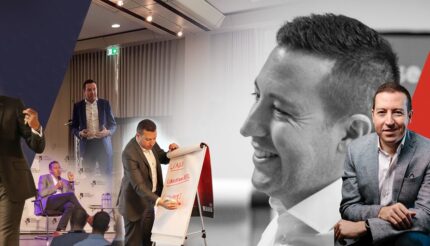The uncommon characteristics of the successful leader, post-pandemic
COVID-19’s speed and scale bred uncertainty and emotional disruption. How organizations communicate about it can create clarity, build resilience, and catalyze positive change. (McKinsey.com)
The last couple of years has delivered dramatic shifts in the business landscape. From boom and bust, remote working, digital acceleration and simply the need to prioritise the health and wellbeing of people, leaders have been pushed to their limits.
Working with businesses throughout the pandemic has shown me that even the best leaders have dramatically shifted their approach to the business and their people, both customers and employees. But it’s the way they handled their priorities with decisive action and clarity of communication that made the biggest difference.
Hard choices need to be made, never more so than during a crisis. Keep those choices or priorities, hyper clear (Gartner)
Having to dramatically shift gears, taking rapid and decisive action based on very little information is not for the faint of heart. It’s been hard work and emotionally challenging for everyone, but I’ve also found it fascinating as I became aware of the seemingly uncommon traits that they all share.
I’m going to share with you the characteristics I’ve identified with my own clients but on the world stage of leadership too, the key differentiators to successful leadership throughout the pandemic and as we begin to emerge.
But, before I begin, it’s worth noting that many of these traits are rarely successful in isolation. They are usually paired with another key trait to ensure leadership excellence. For example, clarity with effective communication or candour with EQ.
Today’s successful leaders are values-driven and purpose-led.
77% of CEOs say their purpose has helped them understand what they need to do to meet the needs of stakeholders, employees, communities, customers, partners and investors. (KPMG)
Clarity matched with effective communication
At the start of the pandemic, anxious employees wanted to know that their leaders had a VISION for how they would navigate the pandemic. With the shifting landscape, they needed reminding or a readjustment of their PURPOSE and reassurance that the VALUEs of the business had not changed.
The most successful leaders understood their purpose from the outset, assimilated their ideas quickly and identified the most effective means of communication to distribute information.
Candour with a large dose of Emotional Intelligence.
Being truly open and honest with your people can be a tricky path to walk. While you need to be mindful of over-sharing it’s important to gain their trust by explaining what’s going on in the business and future plans.
Arguably, the best antidote for a workplace climate of anxiety and cynicism is candour. People respond so much better to the known (even if the news isn’t great), than the unknown (which tends to fuel more anxiety) or even worse misleading half-truths or irresponsible optimism (which can irreparably damage trust long term).’ (Forbes.com)
Emotional Intelligence (EQ).
However, unless that candour is matched with a large dose of EQ, leaders risked the possibility of becoming emotionally detached from their employees and their customers especially when remote working was introduced.
While it’s always been on the list of top leadership traits but now, more than ever before, it’s emerged as a truly essential skill to successfully lead.
You may feel hesitant to expose this level of vulnerability but it’s proven to increase productivity, loyalty and as a result revenue.
Leaders that can understand not only their employees’ emotions and drivers, but are acutely aware of their own are discovering deeper connections, better engagement and increased loyalty from their employees.
Trust & Autonomy
As employees began to work remotely or had been furloughed, business leaders realised they would have to find new ways to engage with their people and maintain trust.
They’d also have to be willing to give their employees the autonomy required to ensure the business could continue being efficient productive and maintain usual levels of CX.
While leaders expected their people to place trust in their decision making, they would have to simultaneously prove they could be trusted to navigate them out of the storm ahead.
Giving more autonomy empowered employees; providing opportunities for accountability and responsibility. While many doors were closing during the lockdowns, others were opened with opportunities emerging.
Trust happens when leaders are transparent. (Jack Welch)
Creating an authentic company culture.
Creating an authentic company culture based on trust, transparency and effective communication is one way leaders are successfully moving their businesses and their people out of the crisis and into sustainable growth.
As we begin to emerge out of the grip of lockdowns and restrictions, leaders need to continue to evolve and adapt to their new roles while continuing to provide growth opportunities for the business and it’s employees.
While the pandemic accelerated a sequence of events such as hybrid working and the acceleration of digitalisation and eCommerce, leaders must now focus on building on these areas for long-term sustainability.
Strong and positive leadership is needed today more than ever before but what does that look like in practice? One of my clients can tell you exactly what that looks like:
The business is now in the hands of two people who are more aware of where their ignorance and weaknesses lie, but who now know how to address these and action processes and systems to scale up, leverage and create a more sustainable and resilient business. (Phil Budd Client)
If you’d like to know more about developing your leadership team or yourself to drive your business forward successfully, let’s talk.




